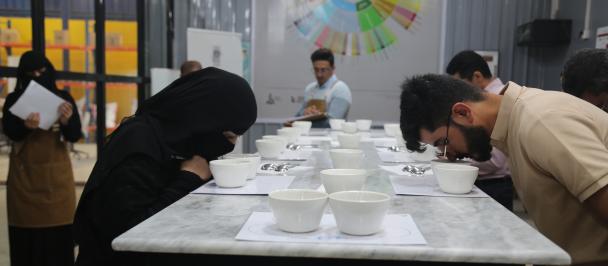Project: Trade for Peace in Liptako-Gourma Region: Burkina Faso, Mali, Niger (March 2021 – March. 2022), supported by Japan
Building livelihoods and investing in the next generation
August 16, 2023

Balkissa Belem (center) tending to her livestock
Balkissa Belem, a mother of three, was displaced from Tétessiro village in Thiou in the north region, due to a horrifying attack by armed assailants. These attackers looted their possessions, seized livestock, ravaged food supplies, and left homes in ruins. Seeking, Balkissa and her community fled to nearby Titao. However, their attempts at reclamation were thwarted when armed men returned, stealing their remaining possessions and carts.
Returning to Titao, the women found themselves in cramped conditions. They were eventually forced to continue to the regional capital, Ouahigouya, where they registered with the local authorities and received initial assistance. However, they were soon left to fend for themselves. Balkissa, who previously worked at a village dispensary, selling medicines, says, “after arriving in Ouahigouya, we had to rely on handouts. “Whenever my husband brings something home, we feel a glimmer of happiness.”
Amidst these challenges, the Trade for Peace project extended a lifeline to Balkissa. She was provided with three rams, cattle feed, and troughs for feed and water.
“The assistance brings me joy, as I believe it will contribute to enhancing my socio-economic situation”
Project in Focus
Trade for Peace in Liptako-Gourma Region (March 2021 – March. 2022): Burkina Faso, Mali and Niger
On 28 April 2021, UNDP Africa Borderlands Centre launched the Trade for Peace regional project implemented in the border regions of Burkina Faso, Mali, and Niger, with funding from the Government of Japan. The aim of the project was to strengthen peacebuilding and social cohesion by deepening economic integration through increased cross-border trade, fostering mutual understanding between border communities, strengthening food security, improving livelihoods, and increasing income opportunities, particularly for women and youth.
The project significantly enhanced the resilience of borderland communities by rebuilding livelihoods through income-generating activities, with a focus on empowering vulnerable groups like women, youth, and internally displaced people. It also revitalised platforms for inter-communal dialogues, fostering connections among communities, while investing in the region’s youth by providing training and access to valuable information, thereby boosting their employability and skills transfer to the next generation.
Key results:
• 7,000 people benefited from cross-border trade infrastructure and productive inputs.
• 68% of beneficiaries reported increased incomes.
• 276 people supported with start-up funds.
Japan and UNDP as key partners
During this project, collaborations with Japanese partners enhanced the achievement of project objectives and ensured visibility. In Burkina Faso, the team partnered with the Provincial Director of Agriculture in Kaya, Centre-Nord region, a former JICA trainee, to train 90 women from the community of internally displaced people and host communities on the Smallholder Horticulture Empowerment and Promotion (SHEP) approach. This was complemented with agricultural inputs provided by UNDP. The women received physical tools and equipment as well as business skills to transition from subsistence farming to market-oriented agriculture.
Thanks to Japan’s unwavering support, UNDP-Japan funded projects are contributing to the realisation of the Sustainable Development Goals and Agenda 2030 across the African continent, empowering communities amidst complex and compounding challenges - often in new and innovative ways.
Since its initiation in 1993, The Tokyo International Conference on African Development (TICAD), has held 8 summits in both Africa and Japan, along with numerous Ministerial Meetings.
Working within the thematic areas of Economy, Society and Peace, Japan and UNDP continue to pioneer innovative solutions fostering a sustainable, inclusive and secure future for all.

 Locations
Locations

